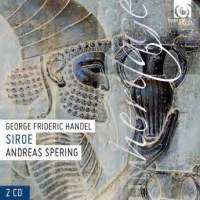Texte paru dans: / Appeared in: |
|
|
Outil de traduction (Très approximatif) |
|
|
Reviewer: Stanley Sadie
A Handel disc with up-to-date virtues, but a heavy-handed approach spoils the set
Siroe is one of the lesser known of Handel's operas today; it is in no one's top 10, nor probably top 20. Well, the competition is stiff. Siroe, composed in 1727-8, was the first opera heard in London to a text by Metastasio, and it isn't one of his best libretti: the plot is inordinately complicated, with a series of disguises, pretences and changes of heart that make the motivation seem pretty implausible, even in the world of Metastasian ethics. Handel's librettist cut a good deal of the recitative, but there are still some lengthy tracts and in this recording, wisely, many further extensive cuts are made.
It's hard to escape the feeling that Handel was not, at any rate at first, really fired by the plot and the characters. There isn't much of Act 1 that is truly arresting. But as the plot thickens , and the situations grow stronger, so Handel , it seems, becomes increasingly involved and the music of Act 2 has some fine things - for example the little arietta for Siroe that begins the act, Laodice's siciliana aria, the dashing contrapuntal aria for Medarse (Siroe's evil brother, who tries to usurp the succession to the Persian throne) and the delightful pastoral aria for Emira (Siroe's lover, who spends most of the opera disguised as a man). And in the Third Act, Siroe, imprisoned, has a remarkable accompanied recitative and a sombre B flat minor aria as he prepares for death.
The performance under Andreas Spering isn't, to my mind, on the level of his recent lmeneo (CPO, 5/04). His direction is at times rather heavy-handed (he would do better to give more thought to the shaping of the bass line) and there is some idiosyncratic orchestral phrasing. His management of tempo is sometimes unsure. Fast tempi fairly rush along - the contrapuntal aria for Medarse that I referred to is ruined by its speed, as is the preceding number for Emira, who could also do with more time for her pastoral aria. Several other numbers are taken at speeds that, one way or the other (there are some ponderous items, too), don 't allow the singers to make the most of the music . And some of the music is excessively ornamented - if free rewriting of Handel's lines, which sometimes happens, can indeed be called ornamentation.
There is plenty of good, strong and agile singing here, though not many moments where one feels that a phrase is nicely turned or an aria gracefully shaped, or indeed that anyone has been encouraged to sing musically. The most successful and most musicianly of the singers is Ann Hallenberg, in the title-role, with her full, slightly throaty mezzo; she rises to Siroe's big moments in the Second and Third Acts. This was originally the main castrato role, composed for Senesino. Johanna Stojkovic sings Emira, composed for Faustina, cleanly and strongly. Sunhae Im, in the Cuzzoni role of Laodice, is fluent and agile but the voice hardens un-pleasingly at the top. The secondary castrato role of Medarse goes to Gunther Schmid, an even-toned countertenor with an unusual, faintly grainy quality. Sebastian Noack provides a full and warm baritone in Cosroe's music and makes a good deal of the sombre 'Gelido, in ogni vena', the F sharp minor aria in the final act when the king, having condemned his son, at last comes to terms with the consequences of his actions.
This set dearly provides a more professional and certainly more up-to-date approach to Handel than the older set, cited above. Yet that set, for all its modern instruments and unsure moments in the orchestra, has in some ways a more sensitive feeling for Handel than the new one, and some of the singing, especially that of Julianne Baird, is of higher quality. Don't jettison it too readily. |
|
|
|
|
|
Cliquez l'un ou l'autre
bouton pour découvrir bien d'autres critiques de CD |
|



